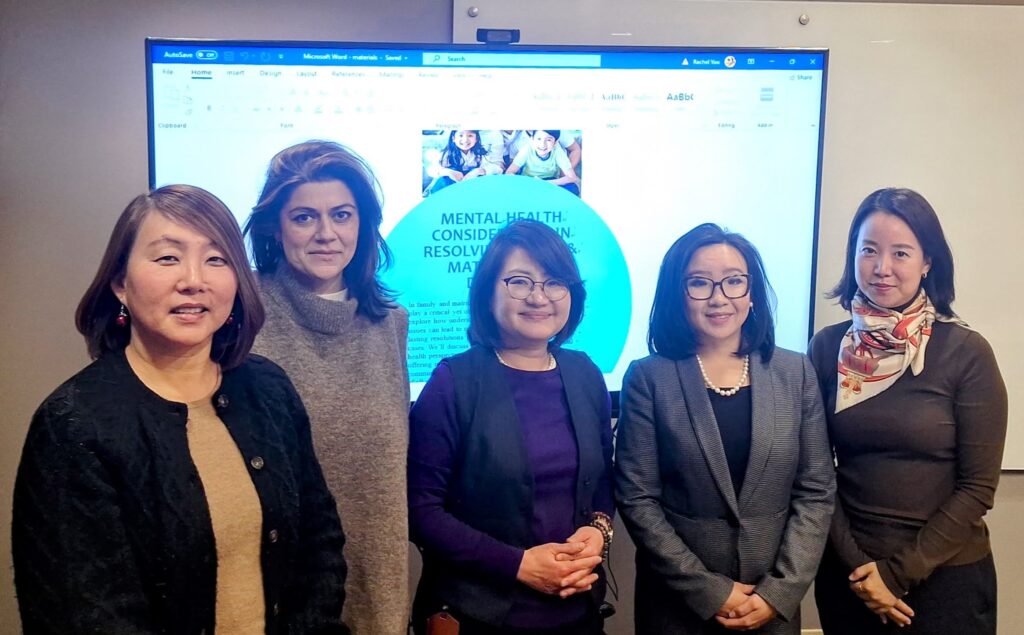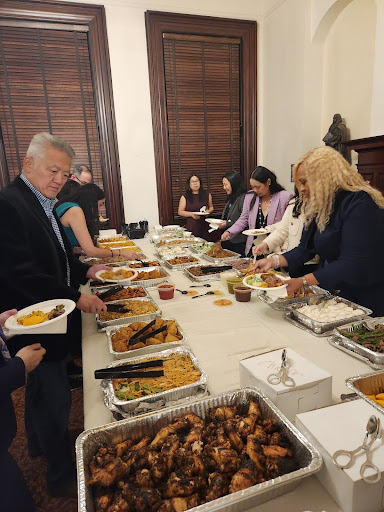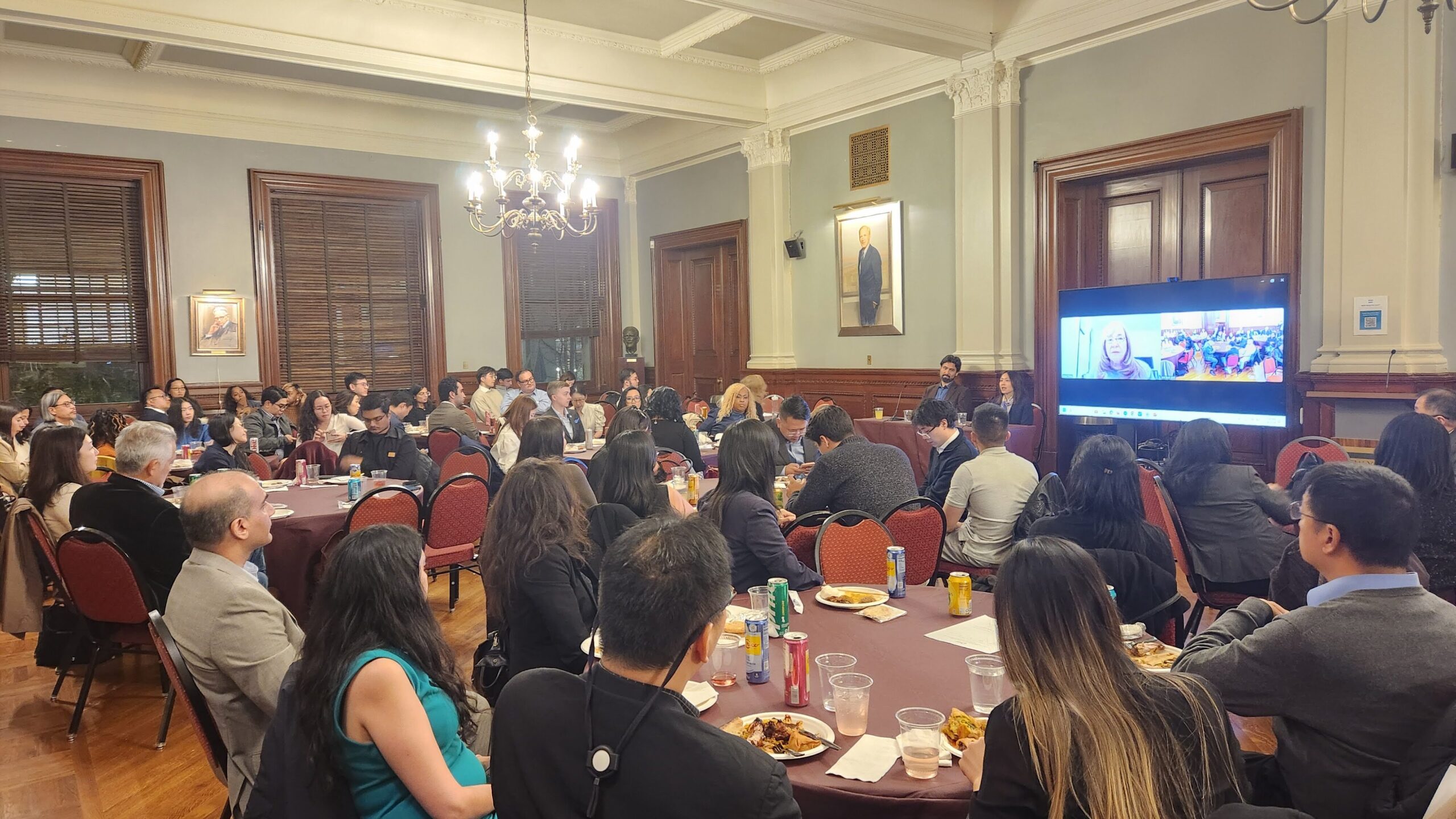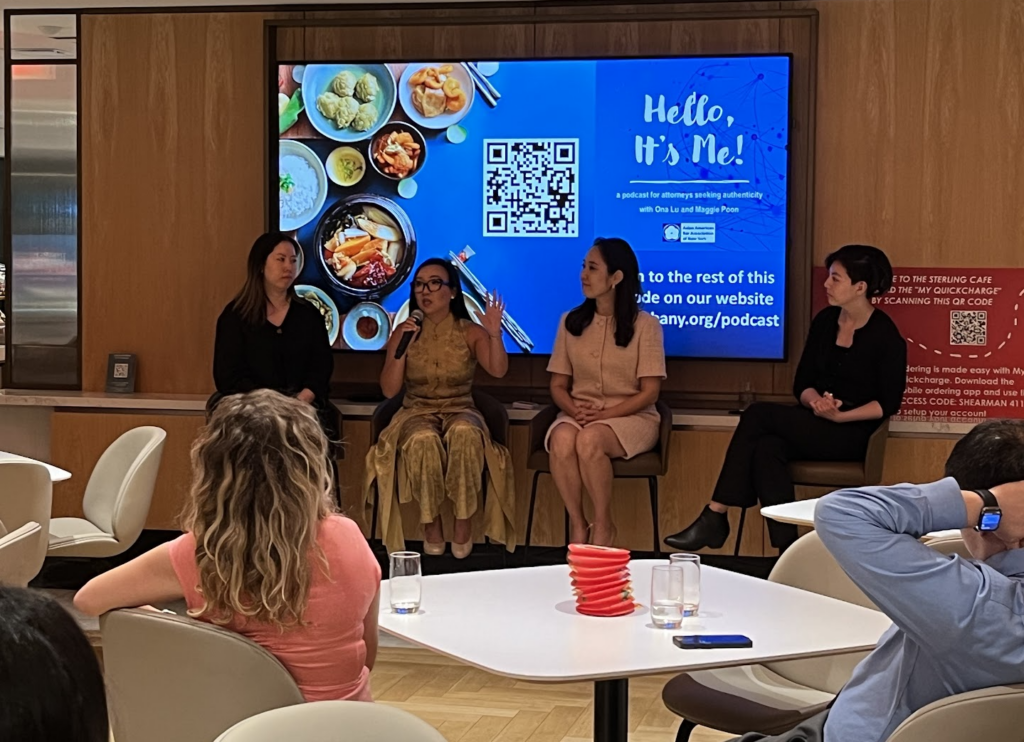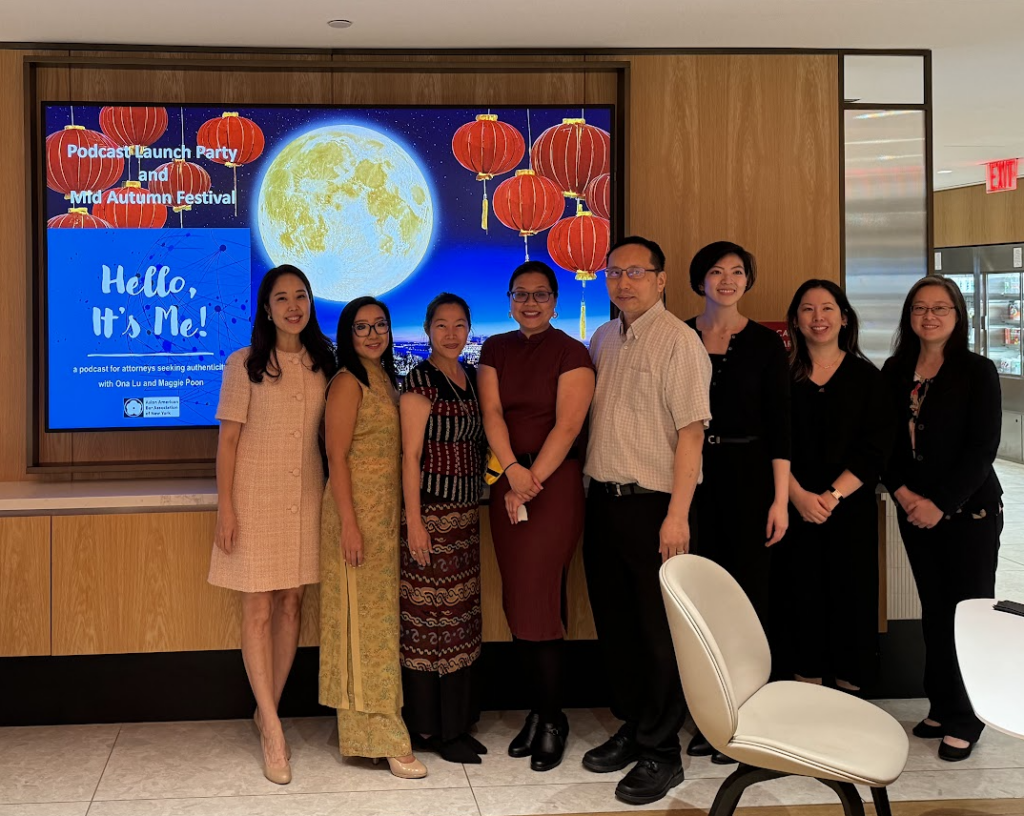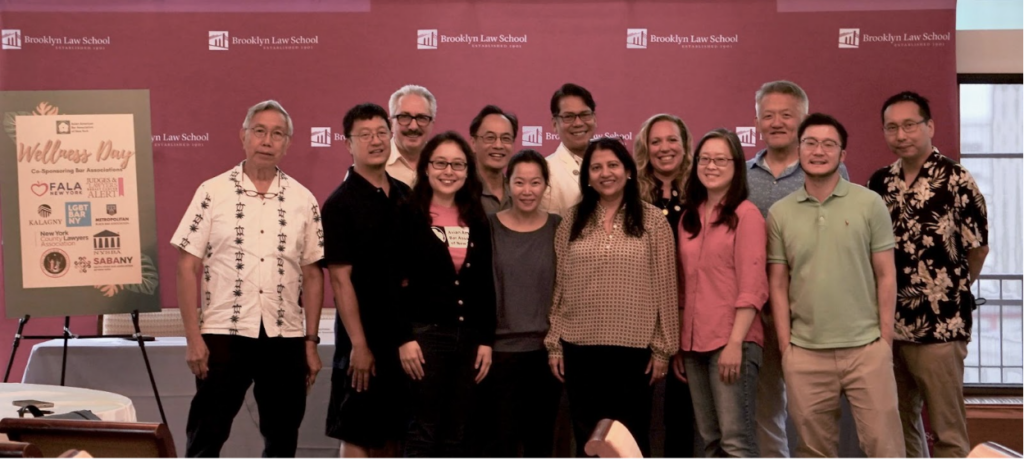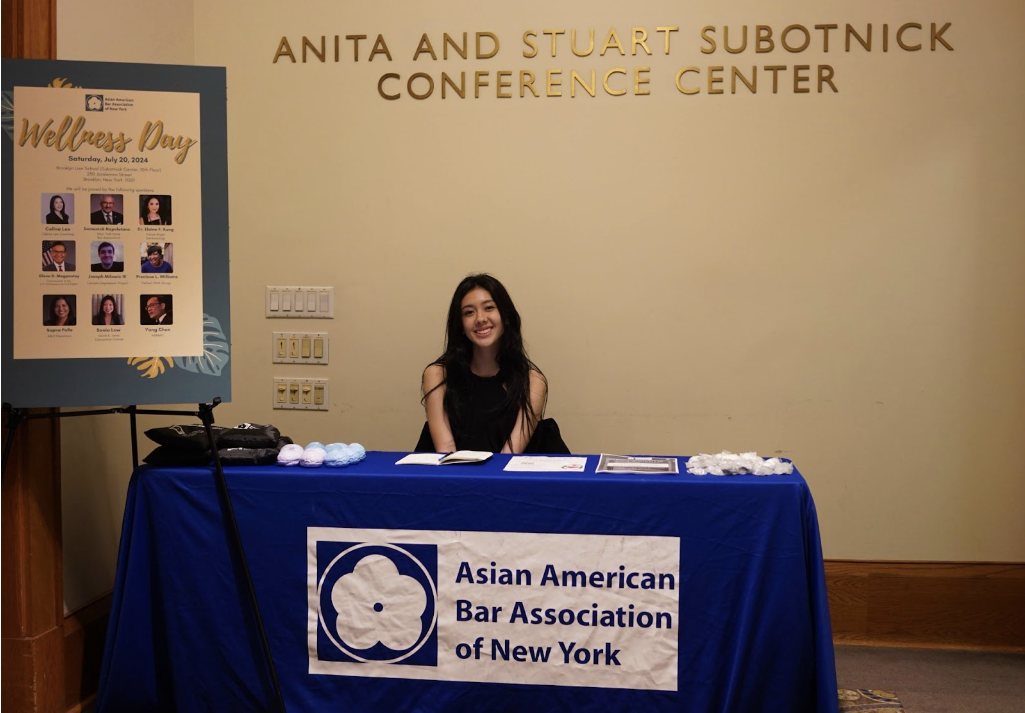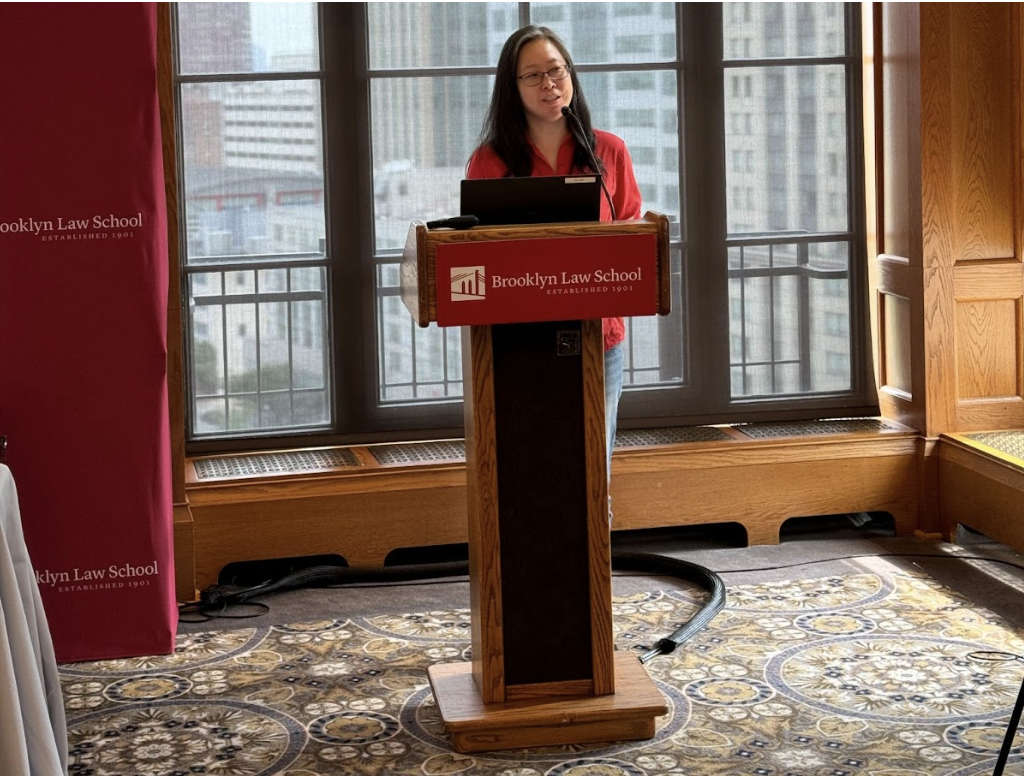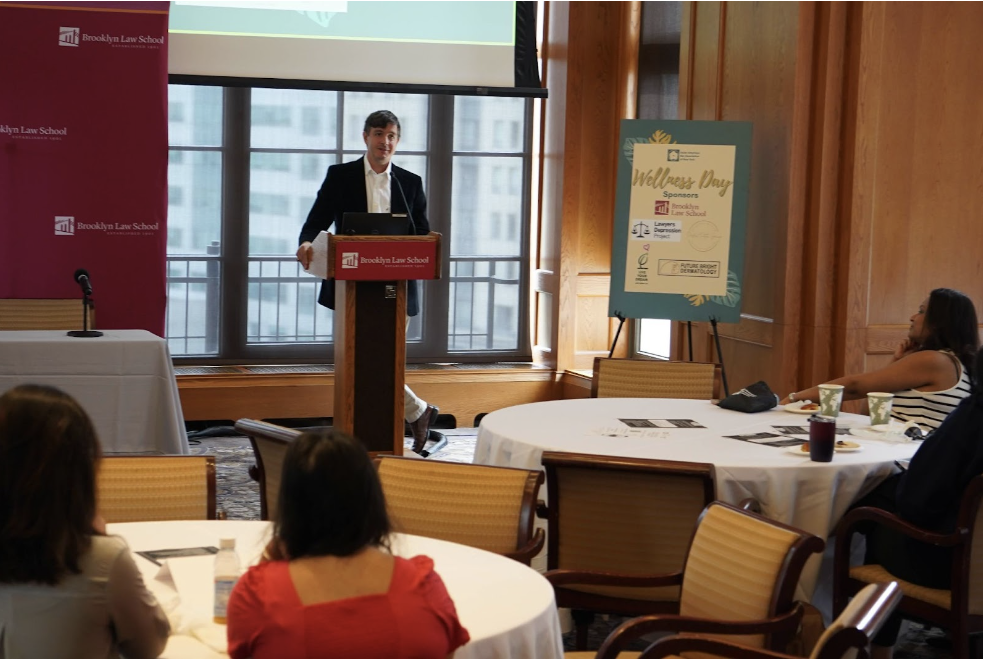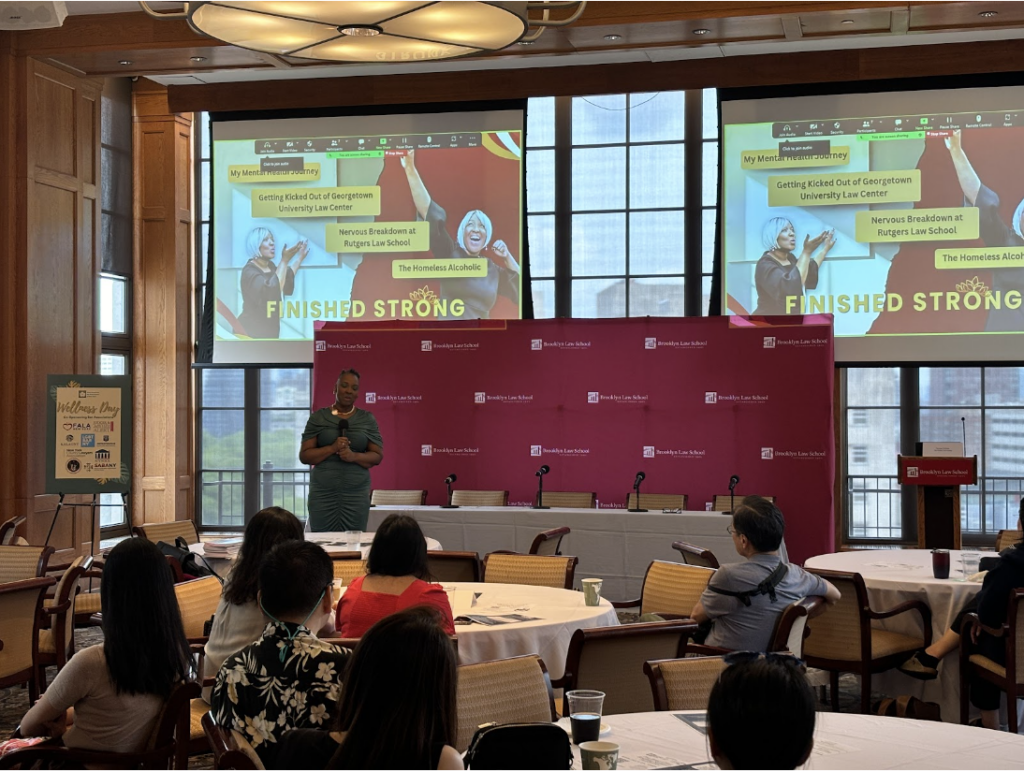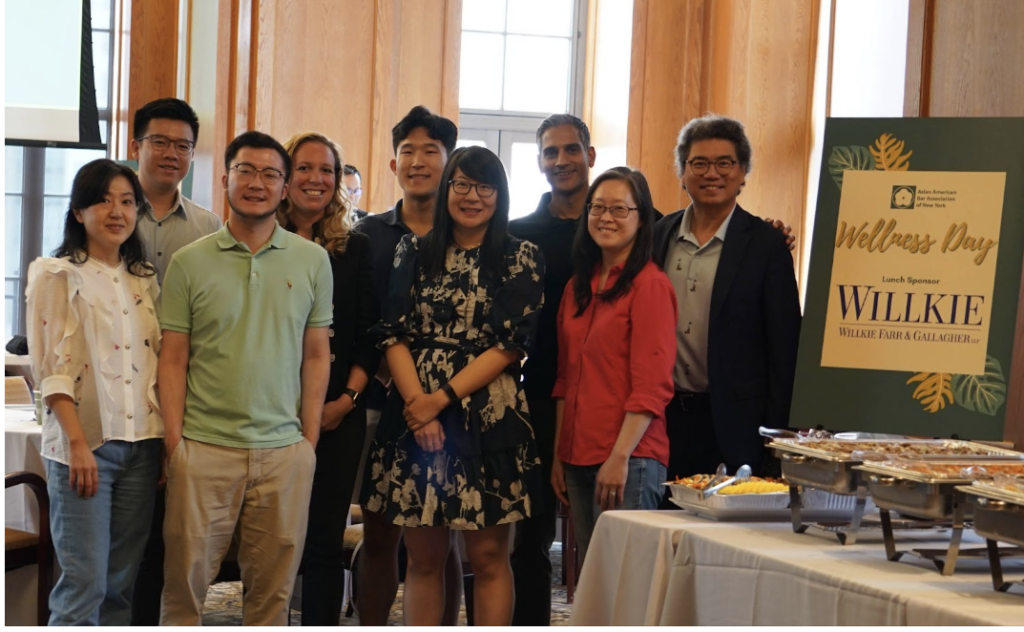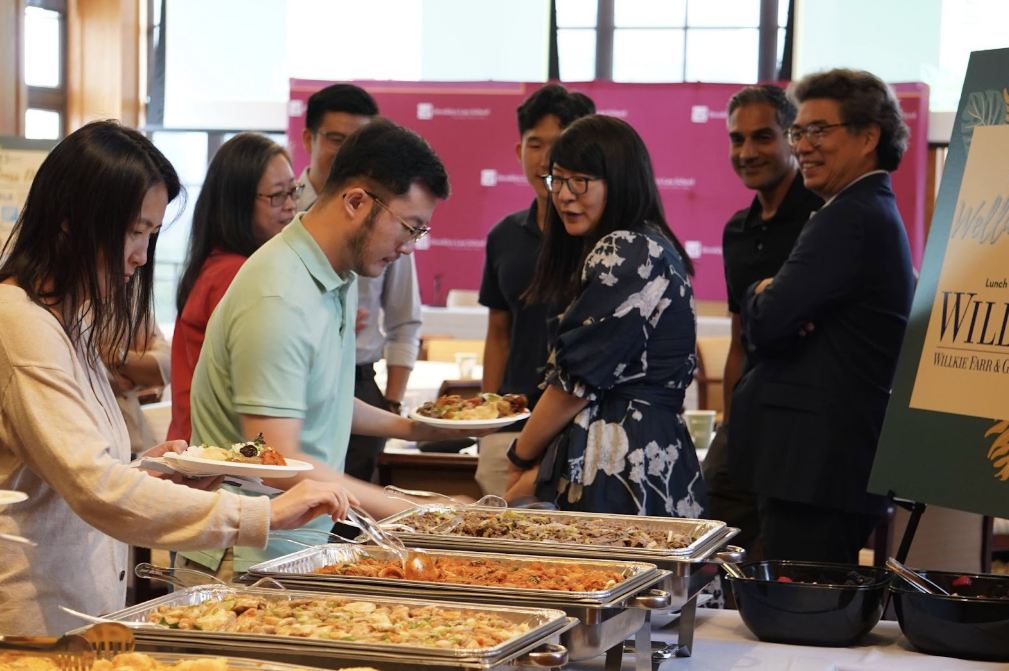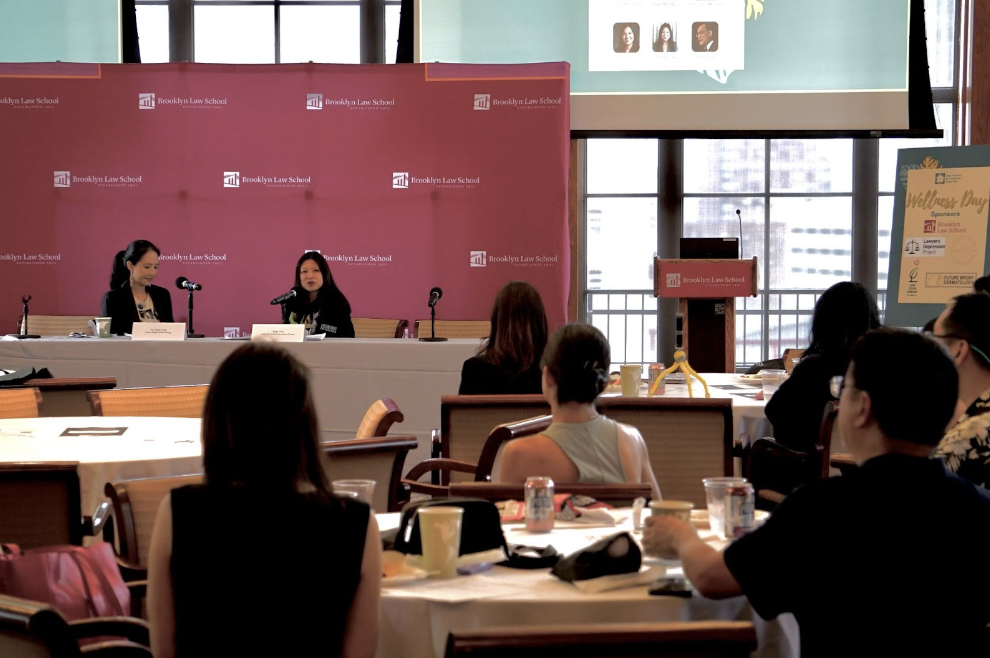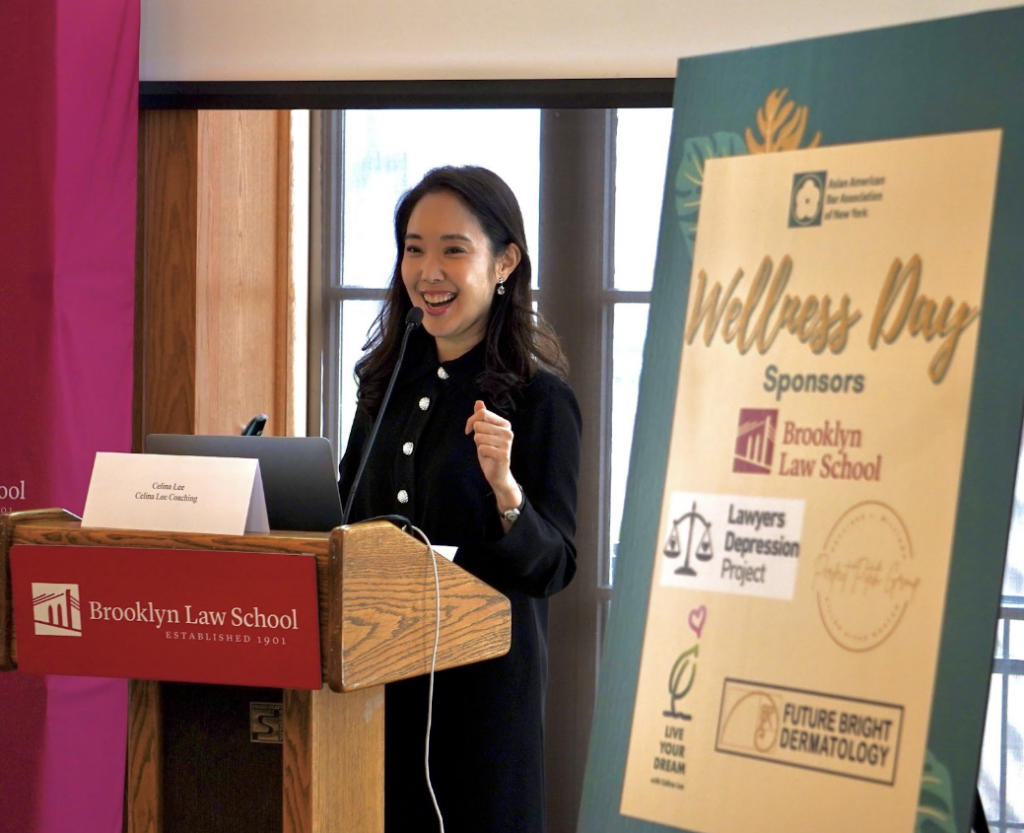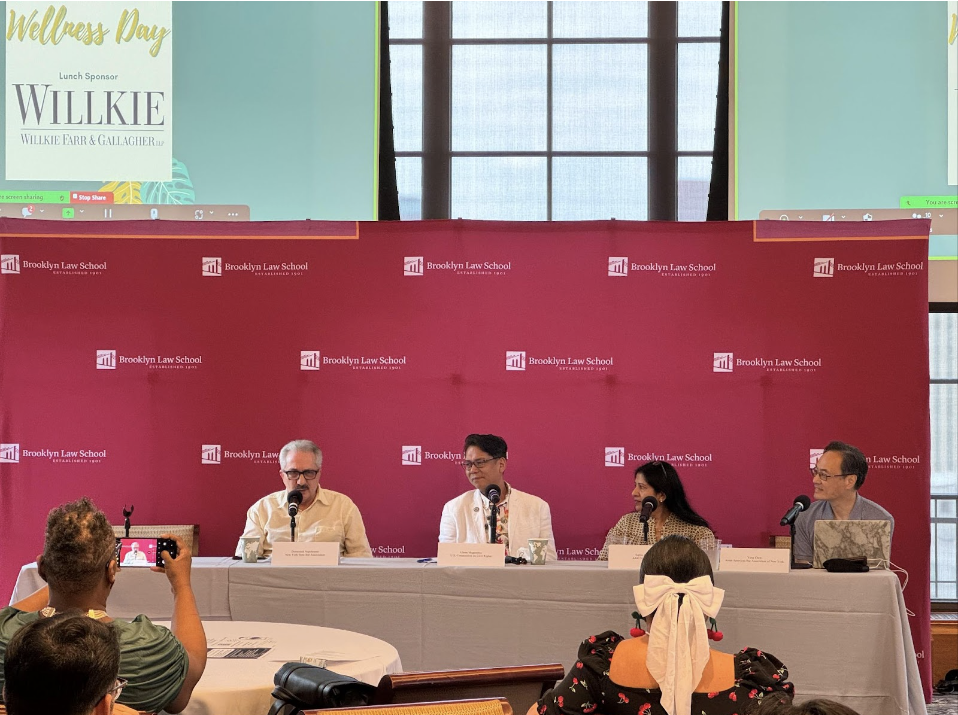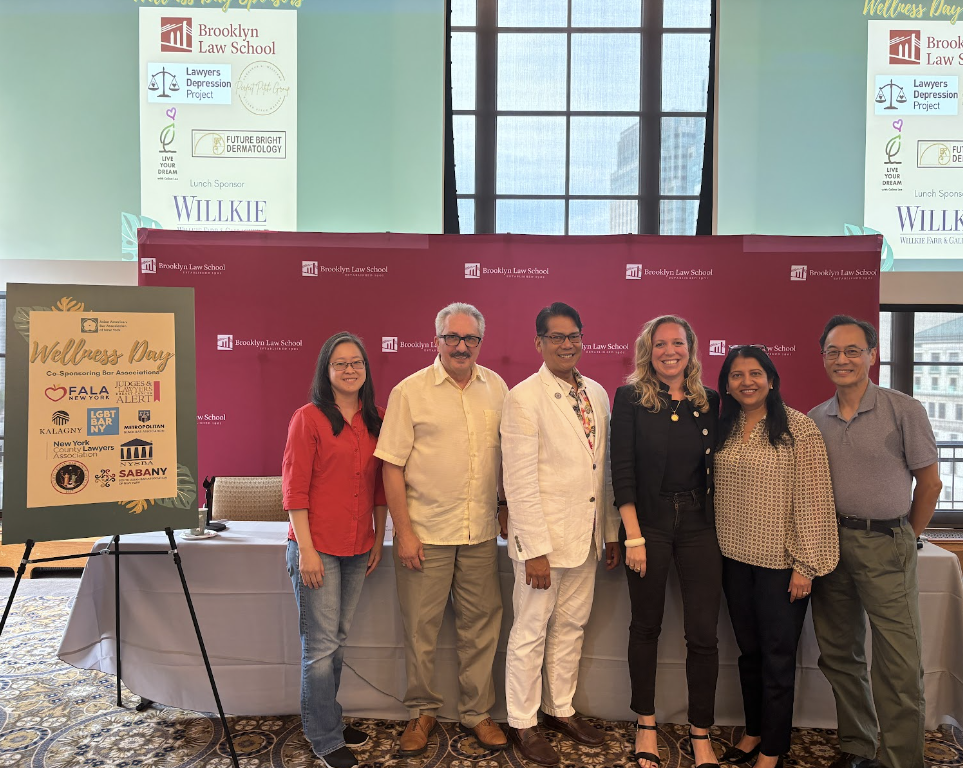
On June 21, 2025, AABANY successfully hosted its Third Annual Wellness Day at Brooklyn Law School. This event was made possible through the generous support of AABANY’s dedicated speakers and sponsors, enabling participants to address critical issues affecting mental and physical well-being, in line with wellness programs and initiatives championed by former AABANY President Karen Kim during her term. Participants learned about various topics, such as methods for dealing with daily stressors, unhealthy drinking culture in the legal profession, signs of depression, and how to find support groups and resources.
Within the legal profession, mental health and well-being is not a topic that is often discussed. AABANY aims to challenge the normalized culture of long hours and drinking prevalent in the legal profession by highlighting the detrimental impact of these behaviors on the well-being of attorneys and offering a dedicated, supportive environment for necessary discussions.

Doors opened for Wellness Day at 9:00 AM. The event began with a relaxing Meet and Greet Breakfast catered by Paris Baguette, providing attendees with an opportunity to meet current and former Wellness Day speakers and greet one another and connect. During breakfast, Karen invited attendees to enter a raffle for a chance to win prizes like a one-on-one coaching session with Celina Lee, a 75-minute Emotional Freedom Technique (EFT) session with Dr. Michelle Thompson, a laser Focus Power Pitch session or copy of Rainmaking 101 by Precious L. Williams, or a parenting coaching session with Dr. Theresa Nguyen.
AABANY President Benjamin Hsing welcomed everyone to the event. On behalf of AABANY, he expressed gratitude to all the participants, speakers, and sponsors who were crucial for the success of the event.
Wellness Day Champion Sponsor, Steno, hosted a table with goodies for attendees, ranging from Pride flags, bags, and iridescent water bottles to glass nail files. Thank you to Steno and Steno representative Gayle Damiano, for your generous support.

Creating a Kinder and Gentler Legal Practice when Grounded with Emotional Freedom Techniques (EFT/Tapping)
The morning programs kicked off with Dr. Michelle Thompson from Resistant Vision, who first introduced Emotional Freedom Techniques (EFT/Tapping). Dr. Thompson shared a compelling story about a client who, after 48 hours without sleep, found relaxation and rest through EFT practices. In her session, “Create a Kinder and Gentler Legal Practice when Grounded with Emotional Freedom Techniques,” Dr. Thompson led participants through tapping their stressors away and detaching them from their minds. She had participants rank their stress levels on a scale from one to ten. By the end of the session, Dr. Thompson had helped the audience reduce their stress levels significantly. She invited a volunteer to help with a specific person causing their stress. Whether it be dealing with stressors at work or stress from academics, Dr. Thompson’s exercises helped everyone gain real-time emotional freedom and learn how to incorporate these practices for the stress that many in the legal profession face on a daily basis. To learn more about Resistant Vision, click here.

Bar None: Rethinking Alcohol in the Legal Profession
Jaimie Nawaday, partner at Seward & Kissel LLP and a former federal prosecutor, brought attention to the drinking culture in the legal profession with her session: “Bar None: Rethinking Alcohol in the Legal Profession,” moderated by Anden Chow, partner at MoloLamken LLP. Ms. Nawaday spoke openly about her personal experience with alcoholism as an attorney. She shared about being in denial about having a drinking problem for a long time and rationalizing her drinking due to the normalized drinking culture in the profession. In their discussion, they highlighted how as a lawyer, receiving and giving alcohol as a gift is normalized. In addition, they noted that many events primarily serve alcoholic drinks. They highlighted how especially for the younger generation of lawyers entering the legal profession, the lack of senior lawyer role models who do not drink might create subtle pressure to engage in heavy drinking.
Ms. Nawaday shared about her progression from doing short health challenges to abstaining from alcohol for a year. She aimed to help spread awareness about the outdated corporate cocktail culture and posted a video on LinkedIn on this topic, which received wide-ranging support from viewers. She also recounted how she helped another lawyer feel included at an event with just the small action of getting them a nonalcoholic beverage. To counter the drinking culture, Ms. Nawaday proposed that it should be normalized to provide nonalcoholic drinks at events and that senior lawyers who do not adhere to the outdated drinking culture should serve as role models. Learn more about Jamie Nawaday’s company Disrupting Drinking here.
Karen Kim took the podium to thank the morning speakers and announce that she would be distributing complimentary copies of The Daily Buddhist, which excited much of the audience. She also announced the lucky raffle winners. With that, the morning sessions came to an end, and lunch was served. Attendees enjoyed a delicious and healthy lunch from Chipotle.

Managing Stress: Maintaining Wellness
The afternoon started off with a session called “Managing Stress: Maintaining Wellness” by pediatrician Dr. Theresa T. Nguyen, who guided participants through the science behind how our brain processes stress. She then led participants through different techniques to ground ourselves, from two different methods of regulating breathing, spacing out inhales, breath holds, and exhales by tracing the fingers on our hand, and box breathing. Dr. Nguyen also invited an audience member to demonstrate the breathing techniques. She then led everyone through somatic grounding techniques, such as rubbing the thumb and index fingers together as well as guided meditation. Dr. Nguyen proceeded to lead the audience through different stretches and acupuncture points to relieve stress, nausea, and tension. Participants left her session feeling relaxed, armed with helpful methods to ground themselves amid stressors in their daily lives. To learn more about Dr. Nguyen’s practices, visit resilientmd.org.

Building Positive Habits: Practical Tips to Sustain a Long, Healthy Career in Law
A fireside chat followed, with Jackson Lewis Principal Tanya Bovée and Well-Being Director Gavin Alexander in a session called “Building Positive Habits: Practical Tips to Sustain a Long, Healthy Career in Law.” Mr. Alexander spoke candidly about his journey struggling with mental illness throughout his life. He talked about how he was initially reluctant to seek help since he thought any paper trail of receiving care would be damaging to his career. Due to the perceived stigma against mental illness in the legal profession and society, it was not until his near suicide that he sought help. Since then, he has advocated for mental well-being and served as the first-ever Fellow of the Massachusetts Supreme Judicial Court Standing Committee on Lawyer Well-Being. Mr. Alexander spoke about finding help in the form of a support group of lawyers with depression, through which he found his current position as a Well-Being Director at Jackson Lewis. When commended on his bravery for sharing his struggles, Mr. Alexander expressed the hope that we all could live in a world where someone like him wouldn’t be deemed brave for sharing his struggles, and talking about mental health would be normalized instead. In guiding the discussion, Ms. Bovée shared her struggles and techniques for better time management and recommended various books for the audience. She also shared personal stories of handling new roles and expectations.
Steno, Champion Sponsor – Remarks
Steno representative Gayle Damiano then gave brief remarks, recognizing Steno as the Wellness Day Champion Sponsor and its support of wellness and well-being in the legal profession. Attendees learned about Steno and its court reporting and litigation services.

But You Don’t Look Depressed
The next session, “But You Don’t Look Depressed,” was moderated by Karen Kim and featured Vivia Chen, an award-winning journalist and ex-lawyer. Ms. Chen shared her story of finding help and opening up about her mental health challenges. Publicly sharing her mental health struggles was difficult due to the stigma around depression in the legal profession. Ms. Chen shared that many lawyers have this stigma, mostly due to their family’s expectations. Asian American lawyers experience higher mental issues compared to the whole of those in the legal profession. Ms. Chen spoke of the challenges to secure short-term disability due to misconceptions around how the symptoms of depression or how those who suffer from depression should look. An insurance representative commented that she did not exhibit the usual signs of depression, such as sobbing uncontrollably or looking unpresentable. In the end, her application for short-term disability was denied. Ms. Chen also spoke about her experience finding a therapist suited for her and seeking help. Her story shines light on the lack of accessibility of help provided by legal workplaces, and the need to change the stigma and misconceptions around mental health, in order to make help more accessible to those who need it. Visit and subscribe to Ms. Chen’s Ex-Careerist Substack Column.
During the discussion, Karen highlighted previous Wellness Day sponsor and participant, Anise Health, a culturally responsive mental health platform dedicated to the Asian community. All attendees received a free trial consultation from Anise Health, as well as a 10% discount code for their first month of care.

Cultivating Mental Resilience to Thrive Amid Uncertainty
Next, Benjamin Hsing, President of AABANY, facilitated a conversation with Pema Sherpa, co-author of The Daily Buddhist, speaker, and mindfulness researcher. They explored how resilience can be cultivated through intentional mind-training practices rooted in Buddhist philosophy and contemporary mindfulness research. Drawing from both personal experience and her book, Ms. Sherpa shared practical tools to manage stress, reframe emotional challenges, and foster inner calm amidst professional demands. She emphasized how simple yet consistent exercises such as meditation, compassion, and mental reframing can strengthen one’s emotional resilience and promote wellness. During the Q&A session, Ms. Sherpa highlighted how the book’s daily format offers readers an accessible and structured path to integrate mindfulness into their routines. Participants appreciated the interactive dialogue, and at the conclusion of the event, Ms. Sherpa graciously signed copies of her book for attendees. Visit Pema Solutions to learn more about mindfulness.
Closing Remarks
Karen Kim delivered ending remarks, thanking everyone for coming to Wellness Day. She gave thanks to all the volunteers, sponsors, and speakers who were vital to making the event successful. Many attendees stayed for the optional networking reception afterward, taking the time to reconnect with old friends and acquaintances and making new connections.
Wellness Day has been a celebration of self-care, health, and the importance of nurturing both mental and physical health. AABANY compiled a Wellness Resources guide and encouraged attendees to reach out to AABANY and the available resources for themselves, their colleagues, friends, and family. AABANY’s Wellness Resources can be found here.
AABANY thanks all Wellness Day speakers for sharing their expertise and personal journeys:
- Michelle Thompson, J.D., Ph.D., CEO of Resistant Vision Coaching and Consulting, LLC
- Jaimie Nawaday, Partner, Seward & Kissel LLP
- Anden Chow, Partner, MoloLamken LLP
- Theresa T. Nguyen, MD, MS, FAAP, Adulting Coach & Wellness Consultant, ResilientMD
- Gavin Alexander, Well-Being Director, Jackson Lewis P.C.
- Tanya A. Bovée, Principal, Jackson Lewis P.C.
- Pema Sherpa, Co-Author of The Daily Buddhist, Speaker & Mindfulness Researcher
- Benjamin C. Hsing, President, AABANY
- Vivia Chen, Opinion Writer, The Ex-Careerist, Substack
- Karen Kim, Senior Counsel, QBE North America
AABANY thanks the following sponsors for their generous support:
Sponsors:
- Brooklyn Law School
- Pema Solutions
- ResilientMD
- Infinite Potential Counseling
- Resistant Vision Coaching and Consulting, LLC
- Live Your Dream Club with Celina Lee
- Anise Health
- Seward & Kissel LLP
- MoloLamken LLP
- Perfect Pitch Group
Champion Sponsor: Steno
Supporter Sponsor: Jackson Lewis P.C.
Co-Sponsoring Bar Associations:
- Judges & Lawyers Breast Cancer Alert
- Haitian American Lawyers Association of New York
Photos from Wellness Day can be found here.


